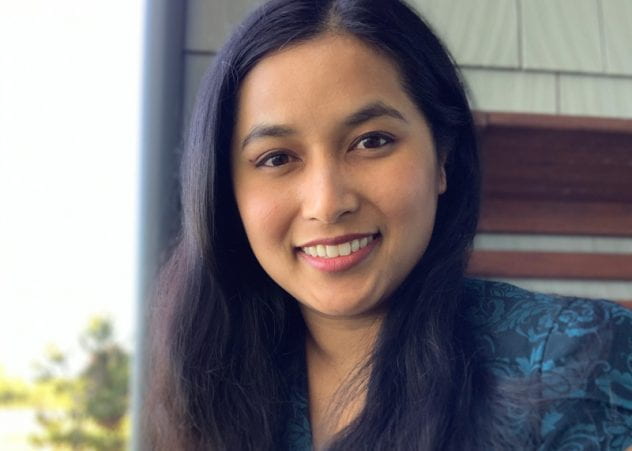
The SJSU Valley Foundation School of Nursing Doctor of Nursing Practice program graduated its first cohort in May.
Eleven members of the San José State class of 2021 are graduates of the university’s Doctor of Nursing Practice (DNP) program — and they are prepared to make a difference in health care in California and beyond.
The cohort is the first to graduate from the SJSU Valley Foundation School of Nursing DNP program since the university launched its own in 2019. Previously, SJSU partnered with Fresno State University to provide a joint program.
Offered mostly online and designed for working professionals, the SJSU program was created to develop leaders in nursing, including advanced practice clinicians and nursing faculty.
California faces a nursing faculty shortage, which affects the amount of nurses graduating from programs. This contributes overall to a lack of practicing nurses in the state, said Associate Professor Michelle Hampton, who coordinates the program alongside Ruth Rosenblum, also an associate professor in the School of Nursing.
“This [faculty] shortage severely limits the capacity to enroll qualified students,” Hampton explained.
So in 2012, the California State University system launched two joint DNP programs — one in Northern California and one in Southern California — to increase the potential pool of future nursing faculty. SJSU was part of the northern consortium, which graduated seven cohorts.
Then, as part of an overall strategy to help improve health care throughout the state of California, starting with Silicon Valley, SJSU launched its own DNP program.
“This doctoral program has helped us reposition the College of Health and Human Sciences as a conduit to the ever-expanding healthcare industry,” said President Mary A. Papazian. “Not only do we want to contribute to one of the fastest growing sectors in Silicon Valley, but in doing so, we must be at the forefront of understanding and addressing the health disparities that exist within our communities’ most marginalized populations.”
Using research to enact change
While a PhD in nursing focuses on advanced research and investigation, earning a DNP degree means learning how to put that research into practice and evaluate its efficacy. Each graduate completed a doctoral project allowing them to do just that.
“Some of these students have been in practice for awhile, and they’re seeing clinical issues that they think warrant further study,” explained Colleen O’Leary-Kelly, director of the School of Nursing. “They want to look a little deeper and expand the knowledge base of these areas. And these projects that I see them working on — they’re just fantastic.”
Vanndy Loth-Kumar, for example, used existing literature and guidelines on caring for patients with schizophrenia to execute her project, “Evaluation of a Wellness and Recovery Medication Services Program” at her workplace, AACI (formerly known as Asian Americans for Community Involvement).
Established patients at AACI had been required to receive therapy in order to qualify for medication services. But the Wellness and Recovery Medication Services (WARMS) pilot program explored whether or not some patients could successfully forgo therapy and still receive the medication.
“Therapy only lasts so long for some people,” Loth-Kumar said. “Once you learn coping skills, how long do you need to continue? The pilot program allowed us to see that some people didn’t need therapy for 15 years; they were able to stay stable. It also freed up counselors to provide care for new patients.”
Because Loth-Kumar was familiarized with WARMS through her project, she was promoted to integrated services lead of the program. She looks forward to “growing and shaping the program, while being mindful of who might fall through the cracks in the system.”
“Before this program, there was a lot of me just complaining about the way things are done,” she shared. “Now, after the program, it’s a lot more of looking into the research to see what can be done. I think it really helped me develop a proactive approach to problem solving in a professional setting.”
Meanwhile, Sandy Phan, a nursing professional development specialist at Stanford Health Care, wants to improve health outcomes by addressing the nursing culture within.
Through her project, “Promoting Civility in the Workplace: Addressing Bullying in New Graduate Nurses Using Simulation and Cognitive Rehearsal,” Phan created and implemented a curriculum to help recent nursing graduates, who occupy the lowest ranks of the hierarchy and are less experienced, to develop skills to identify and address bullying.
“Bullying fractures communication and teamwork, which ultimately can trickle down into patient care,” Phan said. “Units that have bullies can cause more infections and errors, because nursing is a team-based practice.”
“The research indicates that 64 to 97 percent of nurses witness or encounter nurse bullying in their practice,” she explained. “It’s a well-known phenomenon. I think it’s because of the way nursing was founded, in a very patriarchal society. But now, we’re an integral part of the team. We’re leaders.”
Envisioning a healthier future
Lynette Apen, division dean of nursing and allied health at Evergreen Valley College, always had professional goals of serving as an advocate in nursing education, and thanks to the DNP program, she says she’s more prepared than ever to take that on.
She recently stepped into the role of president of the northern region of the California Organization of Associate Degree Nursing, which she says she might not have done as early in her career had it not been for the program.
“This degree has given me the foundation and vocabulary and — though I’m still working on it — the confidence in having conversations with legislators, these decision makers who impact the work of nurses every day,” Apen said.
Last fall, she even testified in favor of the passage of AB 2288, which allowed for flexibility in clinical hours requirements for nursing students during the pandemic and contributed to more California nursing students being able to graduate during COVID-19.
Ultimately, her doctoral project, “Nursing Academic Leadership: An Urgent Workforce Shortage in California Nursing Education,” could increase understanding of how to address a particular shortage of nursing program directors, which is critical to the success of nursing programs.
Apen examined trends in nursing academic leadership positions that will soon leave several vacancies with few options to fill them as well as immediate and long-term interventions to improve the workforce pipeline.
Audrey Shillington, dean of the College of Health and Human Sciences, noted that the pandemic has demonstrated how vital nurses are to health and well-being.
“Despite all the health-care challenges we faced in recent months, both our faculty and students stepped up and leaned into the community needs in addition to what are already demanding roles of teacher and learner. There is no other time when such a stellar group of nursing leaders are needed,” she said.
“I am so proud of all the hard work that our faculty, staff and students have been engaged in during recent years to bring us to this celebration of our first DNP graduating cohort.”
The DNP Class of 2021 and their doctoral projects:
Lynette Vallecillo Apen
Division Dean, Nursing and Allied Health, Evergreen Valley College
“Nursing Academic Leadership: An Urgent Workforce Shortage in California Nursing Education”
Ena Andrea Arce
Health Center Manager, Santa Clara Valley Medical Center
“Programmatic Colorectal (CRC) Screening During a Pandemic: Nursing Telemedicine Education Among Latinx Adults in an Ambulatory Safety Net Clinic”
Vanndy Linda Loth-Kumar
Integration Services Lead, AACI
Public Health Nurse, Santa Clara County Public Health Department
“Evaluation of a Wellness and Recovery Medication Services Program”
Elisa Nguyen
Director of Clinical Services, Stanford Health Care
“The Effectiveness of Resilience Training for Nurse Managers: A Case Study”
Sandy Phan
Nursing Professional Development Specialist, Stanford Health Care
“Promoting Civility in the Workplace: Addressing Bullying in New Graduate Nurses Using Simulation and Cognitive Rehearsal”
Tammi K. Reeves-Messner
Assistant Nurse Manager, Kaiser Permanente
“Neuroprotective Care in the NICU: A Quality Improvement Project”
Reynaldo G. Rosario Jr.
Enterprise Quality Manager – Accreditation, Regulatory Affairs, & Licensing (Santa Clara Valley Medical Center, O’Connor Hospital, St. Louise Regional Hospital, and DePaul Health Center)
“Quality Improvement Initiative: To Improve Surgical Wound Classification”
Dominique Ellen Teaford
Supervising Public Health Nurse III, County of Santa Cruz – Health Services Agency
“Website Redesign Project to Improve the Quality and Usefulness of the Perinatal Mental Health Coalition’s Resource Website”
Stacey L. Teicher
Oncology Nurse Practitioner, Kaiser Permanente
“The Effects of Telehealth on Patient Satisfaction and Information Recall for Breast Cancer Survivors During the COVID-19 Pandemic”
Silvia L. Turner
Nurse Educator, New Nurse Employee Orientation Coordinator, VA Palo Alto Healthcare System
“Virtual Training Impact on Nurses’ Self-Efficacy of Safe Patient Handling Equipment Usage”
Colleen A. Vega
Clinical Nurse Specialist, Stanford Health Care
Lecturer, San Francisco State University
“The Effects of Virtual Reality on Symptom Distress in Patients Undergoing Hematopoietic Stem Cell Transplant”



